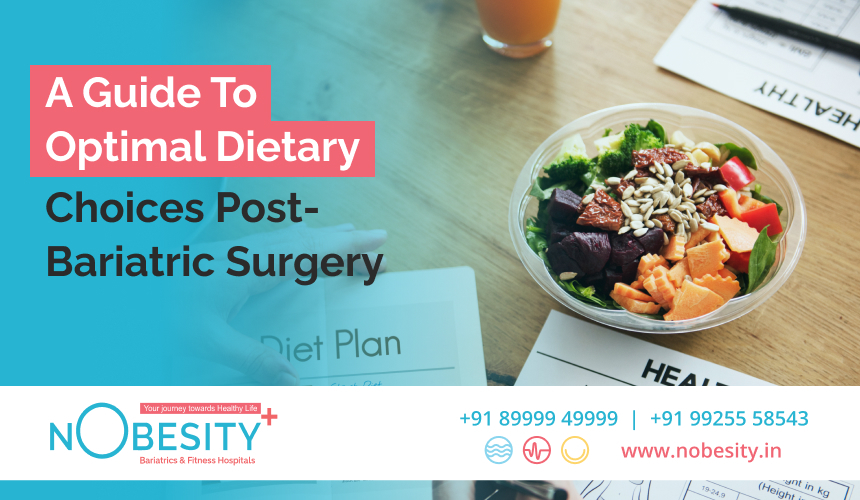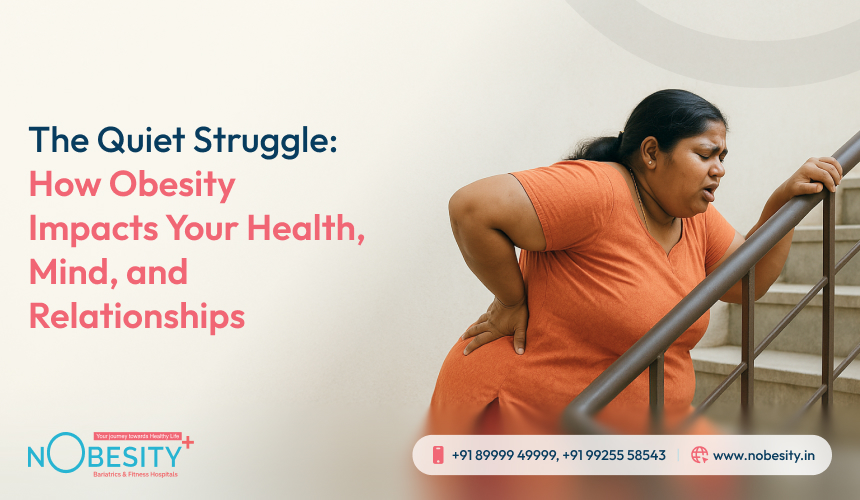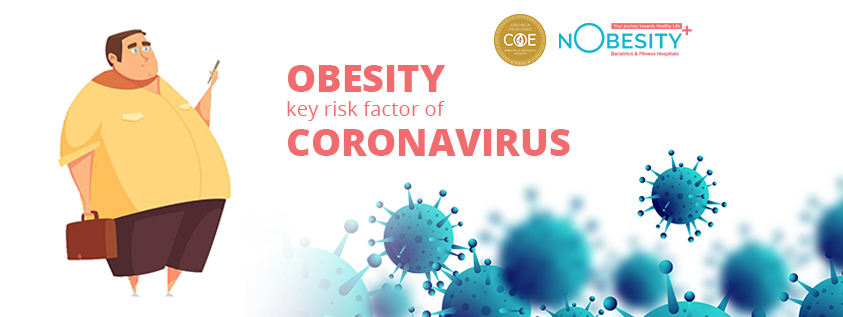
Introduction
As human beings, we always come across some challenging and see-saw phases in our respective lives wherein we have to make brave decisions for our betterment. For obese individuals, one of the best decisions of their lives is choosing to go with the obesity treatment to achieve a significant loss.
Many people perceive that it results in the loss of vital nutrients from the body because of surgery and leads to weakness. In reality, this situation can be dealt with intelligence under the professional guidance of a dietician to ensure you enjoy sustained weight loss and live a healthy life.
However, the path to attaining and maintaining fitness goals post-surgery heavily relies on a post-operative diet and adapting to new eating habits.
If you are planning obesity treatment in Ahmedabad or have undergone one and need clarification on dietary information, this blog is for you. We will provide optimal dietary choices for post-bariatric surgery care and smooth recovery.
Importance Of Consulting A Dietician In The Bariatric Surgery Journey
Patients have a misconception that after bariatric surgery, they have to eat in smaller quantities and consume fewer calories than required because of intestine limitations on food consumption.
It will also aid them in keeping their weight in check and losing more pounds. In reality, the path to recovery and transformation post-bariatric surgery is filled with new dietary guidelines and lifestyle changes that can be daunting but can be adapted seamlessly under a professional dietician’s guidance.
They have expertise in helping patients adapt to post-surgery eating habits by tailoring the meals around their preferences and ensuring they get maximum nutrients from the food.
They know your body won’t accept bulk calories like before surgery. Hence, they assess your ability to absorb nutrients post-surgery and ensure you consume meals in appropriate proportion, giving you essential nutrients for optimal recovery and preventing nutritional deficiencies.
Moreover, consider the dietician as a friend and share your dietary preferences, cheat meals, and favorite foods so they can tailor the diet plan around it. Moreover, dieticians guide you and share information on consuming unhealthy food items.
Hence, never underestimate a dietician’s role in the pre and post-bariatric surgery journey, as their importance will significantly transform your lifestyle and eating habits. You can enjoy sustained weight loss and stay fit for decades.
Tips For Optimal Dietary Choices Post-Bariatric Surgery
Apart from consulting a dietician for meal guidance and nutrient absorption and seeking information on cheat days, it is crucial to put efforts on your end for a smooth recovery.
Hence, we will share valuable tips in this section for optimal dietary choices post-bariatric surgery, ensuring a seamless transition to new eating habits and sustained surgery success.
Mindful Eating
The foremost tip we recommend is changing your eating preferences to slow chewing and taking small bites. Mindful eating is highly beneficial for preventing discomfort and enhancing nutrient absorption as your stomach size is reduced post-surgery.
Stay Hydrated
Hydration is critical for rapid and optimal recovery and for overall health. Drink fluids half an hour before and after meals. Avoid consuming during meals, as it can cause discomfort and affect your food intake.
Also, we recommend drinking at least two liters of water daily for the first few months post-surgery and then gradually increasing the quantity.
Prioritize Protein
Like other nutrients, protein is highly beneficial for healing and maintaining muscle mass post-surgery. Hence, include lean protein sources and low-fat dairy products in your meals. Remember, a protein-rich diet will support your body’s recovery and enhance overall health.
Limit Sugary and High-Fat Foods
Consuming foods high in sugar and fat leads to dumping syndrome, a condition causing diarrhea, vomiting, and nausea. It also increases overall daily calorie intake without giving rich nutritional value.
Hence, we suggest opting for their healthier alternatives by consulting your dietician and consuming the needed sugar quantity and fats in moderation.
Focus on Nutrients Rich Food
After surgery, it is pivotal to choose foods that offer the most nutritional value to cover any deficiencies caused by altered nutrient absorption. Consulting a dietician is the wisest decision, as they will suggest foods rich in vitamins, fibers, and minerals to ensure your body covers up any deficiencies and meets daily nutritional needs to enhance overall health.
Introduce Foods Gradually
After surgery, your diet will gradually transition from liquids to mashed food, then to chopped and sliced, and finally, to solid foods. Your dietician will introduce foods slowly based on your body’s intake capacity and digestive abilities. This step-by-step approach helps prevent stomach intolerance and gastrointestinal discomfort.
Listen to Your Body
Next, it is pivotal to pay attention to your body’s signals post-surgery, which will vary from what you were previously accustomed to. Also, don’t overlook the hunger and stomach fullness cues to avoid over- and undereating.
If certain foods aren’t suiting your changed lifestyle and causing stomach discomfort, speak to your dietician, who will suggest alternatives that your body can adjust to.
Plan and Prepare
Last but not least, be sure to plan your meals and snacks as prescribed by your dietician in advance to prevent cravings and unhealthy eating choices. Keeping nutrient-rich meals ready will keep your mind away from deep-fried and outside junk food.
Also, you can track your daily nutritional consumption in a diary and determine which foods benefit your body. It instills confidence in you that you are feeding yourself the right meals.
Incorporating the above tips into your regular routine post-surgery will help you experience a positive change in your lifestyle and contribute to rapid recovery. Ensure you consult your dietician through regular check-ins to adjust your diet plan based on your evolving dietary needs, recovery progress, and challenges.
Conclusion
Navigating the diet after bariatric surgery is a journey filled with learning, adaptation, and transformation. A dietician plays an integral role by providing the knowledge, support, and motivation to ensure that your eating habits lay the foundation for a successful and sustainable lifestyle.
After reading the blog, you will be equipped with the importance of consulting a dietician for post-bariatric success and tips for optimal dietary choices. Every tip contributes to bigger milestones, prevents challenges, helps you mentally stay committed to your new lifestyle, and maintains weight loss for decades.
At NObesity, our patients have smoothly adapted to the prescribed dietary guidelines and new healthy lifestyles in 4-8 months. Always remember that what we eat shapes our overall appearance and reflects in our personality.
Also, food plays an 80% role in your obesity and post-operative care, and the rest is exercise. Hence, your dedication to optimal dietary choices will pave the way for a healthier life.
Don’t you think receiving lifelong dietician support will be a cherry on the cake after restoring your dietary preferences and eating habits to normal post-surgery? If yes, let us tell you that at NObesity, we offer lifelong dietician support to ensure that you are not only eating healthy meals all the time but also enjoying a pinch of your favorite outside food to complement cheat days.
It will also give you a boost that you are able to maintain the significant weight loss achieved through bariatric surgery for a lifetime. You can stay worry-free as your meals are nutrient-rich and provide the needed dietary balance.
Dr. Manish Khaitan, a bariatric surgeon at NObesity, feels that in his 15+ years of bariatric surgery experience, he has seen that patients don’t stay in touch with dieticians for consultation after a couple of years.
Hence, the NObesity team puts efforts into providing lifelong dietician support to our patients who underwent an obesity operation in Ahmedabad at our center.
As the best bariatric surgeon in Ahmedabad, Dr. Manish Khaitan has ensured that his patients not only receive psychological support post-surgery but also dieticians who look after patients’ eating habits and preferences to ensure they are consuming healthy, nutritious food.
Our team of dieticians and nutritionists provides proper guidance to ensure you consume 5-6 meals daily on time and give your body sufficient nutrients.
Our commitment to providing a comprehensive team of counselors, psychologists, and dieticians is shifting obese individuals’ preference toward us for the bariatric surgeon in Ahmedabad.
However, if you have any questions or need further clarification, feel free to contact us at +91-8999949999, +91-9925558543, or info@nobesity.in.








